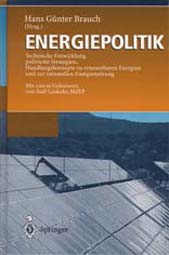 |
Hans
Günter Brauch (Ed.)
Energiepolitik
Technische Entwicklung, politische Strategien,
Handlungskonzepte zu erneuerbaren Energien und
zur rationellen Energienutzung
[Energy
Policy
Technical Development, Political Strategies,
Concepts for Action on Renewables and
on Rational Energy Use]
1997,
776pp., ISBN 3-540-61759-0,
€ 98.08 + 7% VAT
Contents
|
|
A team
of expert authors deals with problems of energy systems and
technology in this collection of interdisciplinary studies.
Water and wind power, biomass, geothermal, photovoltaic and
solar-thermal energy are included. Essays also deal with improving
marketing and utilization in the European Union (EU), United
States, and Japan; activities of the German government and
proposals of nongovernmental organizations (NGOs); strategies
for rational utilization; methods of reaching consensus; criteria
of evaluation and proposals for use in the Mediterranean area
and in Africa; and political options and obstacles.
Authors:
Dr. Christian Ahl; Prof. Dr. Günter Altner; Dipl.-Ing.
Thomas Uwe Carstensen; Prof. Dr. Hans-Peter Dürr; Dipl.-
Ing. Matthias Eichelbrönner; Dr. Ulrich Fahl; Dr.-Ing.
Franco Furger, Dipl.-Ing. Helmut Geipel, Prof. Dr. Joachim
Grawe; Dr. John Grin; MR Dr. Paul-Georg Gutermuth; Dr. Hermann
Henssen; Prof. Dr.-Ing. Hans-Burkhard Horlacher; Dr.-Ing.
Martin Kaltschmitt; Prof. Dr.-Ing. Werner Kleinkauf; Prof.
Dr.-Ing. Helmar Krupp; Dr.-Ing. Helmut Lawitzka; Dipl.-Phys.
Harry Lehmann; Dr. Rolf Linkohr, MdEP; Dipl.-Ing. Holger Liptow;
Dr. Hans-Jochen Luhmann; Prof. Dr. Joachim Luther; Dr. Dr.
Jacob Emmanuel Mabe; Dipl. Pol. Andreas Maurer; Dr. Lutz Mez;
Prof. Dr. Gerd Michelsen; Prof. Dr. Werner Nahm; Dr.-Ing.
Joachim Nitsch; Dipl.-Ing. Daniel Nottarp; Dip.-Ing. Rolf-p.
Owsianowsky; Dr. Peter Palinkas, MR Dr. Walter Sandtner; Dr.
Burkhard Sanner; Dipl.-Ing. Peter Schaumann; Dipl.-Wirtsch.-Ing.
Michael Schreiber; Prof. Dr. Rolf Peter Sieferle; Dipl.-Wirtsch.-Ing.
Frithjof Staiß; Dr. Bernhard Truffer; Prof. Dr.-Ing.
Alfred Voß; Dr. Rainer Walz; Prof. Dr. Wolfram Wettling;
Dr.-Ing. Andreas Wiese; Prof. Dr.-Ing. Carl-Jochen Winter;
Dr. Volker Wittwer, Prof. Dr. Karl Wohlmuth.
The book
is organised in 10 parts and contains 36 chapters. It is introduced
with a preface by Rolf Linkohr, a member of the European Parliament.
In the appendix it includes a list of the used measures, a
comprehensive list of addresses on energy policy, a glossary,
a comprehensive list of literature, biographies of the editor
and of the authors and a detailed index including persons
and subjects.
After
an introduction by the editor on: "energy policy in the
context of climate policy in the transition to the 21st century",
part I on energy history and energy systems includes three
chapters by Rolf Peter Sieferle on the pre-industrial solar
energy system and two chapters by Carl-Jochen Winter and Alfred
Voß on the basic statements of thermodynamics. Part
II on energy technology and potentials for renewables includes
six chapters by Hans-Burkhard Horlacher on global and national
potentials for hydropower, by Andreas Wiese and Martin Kaltschmidt
on wind energy usage in Germany, by Werner Kleinkauf on the
perspectives for wind energy use in Germany, by Christian
Ahl on biomass, by Burkhard Sanner on geothermal energy and
by Joachim Luther, Wolfram Wettling and Volker Wittwer on
solar thermal and photovoltaic energy systems.
In part
III on the improvement of the frameworks for the commercialisation
of renewable energy three chapters by Hans-Joachim Luhmann
on tax incentives for renewables, by Franco Furger and Bernhard
Truffer on environmental certificates and by Michael Schreiber
on energy conservation contracting. In Part IV on action plans
and subsidies for renewables in the European Union, the US
and Japan for renewables includes three chapters by Peter
Palinkas and Andreas Maurer on the European Union, by Hans
Günter Brauch on the USA and by Helmar Krupp on Japanese
energy policy.
In part
V four chapters deal with activities by the German federal
government with regard to renewables and for rational energy
use by Walter Sandtner, Helmut Geipel and Helmut Lawitzka
on the research emphasis with regard to renewables and energy
conservation, by Paul-Georg Gutermuth on improved frameworks
for the commercialisation of renewables, by Holger Liptow
on the support for the German development cooperation and
by Rolf.-p. Owsianowski on German development activities in
Morocco. Part VI on concepts and proposals of non-governmental
actors for CO2 reduction includes four chapters by Joachim
Grawe representing the electricity industry, Uwe Thomas Carstensen
for the renewable energy industry, Werner Nahm for the German
Physcial Association and Harry Lehmann for Eurosolar.
In part
VII four chapters by Alfred Voß, Ulrich Fahl and Peter
Schaumann, Günter Altner, Hans-Peter Dürr, Gerd
Michelsen and Joahim Nitsch as well as by Rainer Walz and
Daniel Nottarp deal with rational energy use, renewables,
nuclear energy and clean coal and their short-, medium and
long-term potential for reducing CO2 emissions. In part VIII
Lutz Mez, John Grin, and Matthias Eichelbrönner and Hermann
Hensen discuss strategies and methods for a new energy consensus
in Germany and criteria for the assessment of energy systems.
In part
IX Joachim Nitsch and Frithjof Staiß, Hans Günter
Brauch, Jacob Emmanueal Mabe and Karl Wohlmuth discuss concepts
for action and proposals for an expansion of the use of solar
energy in the Mediterranean and in Africa. Finally, in part
X, instead of conclusions Hans Günter Brauch addresses
problems of commercialisation and export promotion for renewables
within the triad: political options and constraints.
|
|
hgb023;
Language: German; Areas: renewables, biomass,
hydro, solar, water, wind; Region: global, Europe,
Germany, Japoan, United States, Mediterranean, Africa.
|
